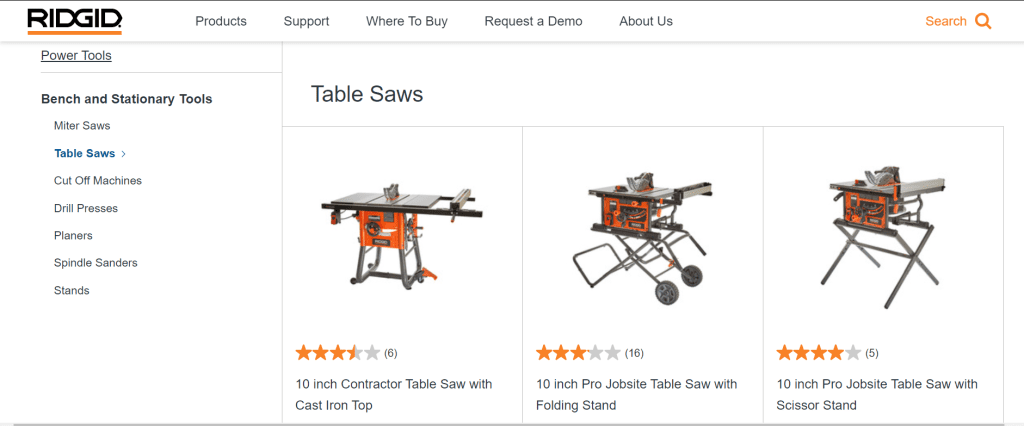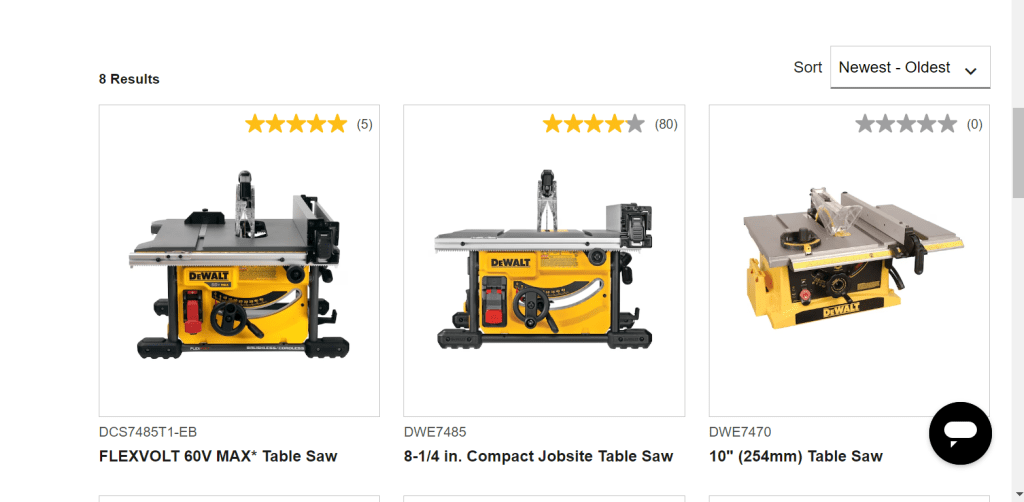When it comes to powerful workshop tools, every craftsman and carpenter has their brand loyalty. And the classic debate seems to always come down to Ridgid vs Dewalt table saws.
Both companies make quality saws that will be the centerpiece of your shop for years to come. But there are some key differences between Ridgid and Dewalt to consider before investing in one of these cabinet saws.
As someone who has used both brands extensively to build everything from shelving to custom cabinets, let me walk you through how Ridgid and Dewalt table saws compare head to head. By the end, you’ll know which is better suited for your projects and budget.
Reliability and Durability
The first thing I want to know before buying any major power tool is will it stand the test of time? Will I be struggling with breakdowns and repairs or will it keep running smoothly for decades of heavy use?
In my experience, both Ridgid and Dewalt build their signature table saws to high standards. They use sturdy materials, quality components, and thoughtful engineering. Either brand invested in today should serve you well into the future if properly maintained.
Now Ridgid does back their saws with the industry leading lifetime warranty. That shows serious confidence! If anything breaks or malfunctions, Ridgid will repair it.
Dewalt offers a shorter 3 year limited warranty. But their tracks record for reliability is proven. So while the coverage may be shorter, most users report years of trouble-free service.
For pure durability, I would say Ridgid takes a slight edge. But Dewalt users certainly enjoy years of predictable performance as well from their investment. Either is a solid choice.
Precision and Accuracy
Ridgid Table Saw

It doesn’t matter how powerful a table saw is if it lacks precision. The best saws allow you to make cuts with total accuracy and control.
Ridgid saws are well regarded for their precision thanks to thoughtful design elements. The micro-adjust rip fence glides smoothly to exactly where you need it. You get clear readouts showing the blade position and angle down to precise 1/32nd fractions.
Overall fit and finish feels very tight with minimal vibration. This allows you to make very clean, precise cuts.
Dewalt is right there as well when it comes to precision capabilities. Their fence system is smooth and sturdy. The digital readings of settings are clear and accurate.
If I had to choose one as the winner for precision, I may lean very slightly again toward Ridgid. Though models like the Dewalt DWE7491RS are fantastic for fine carpentry too. Either will serve an exacting carpenter well.
Cutting Power
Dewalt Table Saws

Now when it comes to pure cutting strength, that’s where these brands start to differentiate themselves more.
Dewalt’s models meant for job site use emphasize maximum cutting capacity and power. Their 15 and 20 amp motors can churn through even dense hardwoods and shelving materials with ease.
While no slouch, the Ridgid saws tend to be optimized a bit more for fine carpentry than brute strength. They offer great versatility but reach their limits quicker on super dense stock.
If your needs demand sawing through thick oak, maple, treated timber, etc on a regular basis, a more powerful Dewalt unit may be the better choice. For lighter duty crafting, Ridgid still excels.
Portability
Many carpenters split their time between job sites and a home workshop. In that case, being able to transport your table saw reasonably easily is key.
Dewalt’s Jobsite saws shine here with compact designs made for mobility. The built-in wheels, fold up stands, and lighter weights mean these units can be moved in and out of trucks solo. Though they compromise a bit of power for their portability.
Meanwhile, cabinet saws like the Ridgid R4520 tend to be beefier and heavier. At almost 300 lbs they are meant to basically live in your workshop indefinitely. But carts can be used move them.
So if you value easy transport Dewalt Jobsite saws win out. For a fixed workshop saw, Ridgid is just fine. Choose based on how mobile you need to be.
Accessories and Expandability
One of my favorite things about my Dewalt Jobsite saw is how many addons and accessories I can incorporate over time. Dust collection, extra wide outfeeds, specialty blades, miter gauges and more. This allows the saw to really grow with your needs and skills.
Ridgid is a bit more limited in third party accessories designed to integrate seamlessly with their saws. Though you can certainly rig up compatibilities yourself if desired.
Out of the box, either brand provides you with the essential miter gauge, blade guard, fence to get started. But Dewalt opens more possibilities to enhance your saw over time.
Safety Features
Operating a powerful table saw obviously requires strict safety awareness. But modern features that help avoid accidents are always welcome.
Here Ridgid does have a thoughtful advantage in their SawStop licensed technology. In the event your skin touches the blade, an electric brake engages instantly to prevent serious injuries.
It’s brilliant added insurance I appreciate having, especially when working around children in my home shop. This technology may be coming to Dewalt saws soon as well. But for now it sets Ridgid ahead on the safety front.
While no substitute for caution, SawStop can help protect from those instinctual moments we all have of distraction or just plain clumsiness. Well worth consideration if you value safety.
Serviceability and Maintenance
Like any complex power tool, table saws do require periodic maintenance, calibration, and occasional part replacements to keep performing as expected. This mainly involves the blades, belt, and fence system.
What I like about Ridgid is the clear access panels allowing you to self-service parts like the belt and blade components. Simple tools let you handle most repairs right in your own shop.
Dewalt uses more proprietary components that can make it harder to self-service unless you really know your way around the tool. Their products tend to be designed to be disassembled by authorized techs with specialized training when issues arise.
For a home carpenter who wants to handle routine tune ups personally, Ridgid does provide a bit more owner-serviceable design. Call Dewalt tech support when problems exceed your mechanical comfort zone.
Cost Comparison
Now for many shoppers, the final decider comes down to budget. How much performance can you get for your dollar from each brand?
As a premium name, Dewalt commands a premium price tag. Their flagship cabinet saws retail between $1000-2200+ depending on power and features.
The more compact Jobsite table saws cost a bit less in the $600-800 range but sacrifice cutting capacity for mobility.
Ridgid remains competitive with their new saw models retailing in the $800-1500 range. You still get their signature rugged build quality at a more mid-tier price point.
For an affordable quality saw as the centerpiece of a home hobbyist workshop, I would suggest Ridgid provides the most value balanced with performance
If budget is no concern and you demand maximum cutting capability from a portable saw, Dewalt may justify the higher investment. You pay for the power and innovation their name is built upon.
Making the Best Choice for You
Well, we’ve covered a whole lot of factors to consider in this Ridgid versus Dewalt matchup. At the end of the day, the right choice depends on your needs.
For safety minded hobbyists doing more finish carpentry work, the thoughtful features of Ridgid saws become highly attractive. Their balance of precision, safety additions, and serviceability make sense for detail work.
However, no serious contractor would scoff at a Dewalt jobsite model packed with strength and portability. Their cutting capacity and brand reputation meets the demands of rigorous job site use.
My advice is to carefully consider what types of projects you take on most before deciding which suits you best. Understanding your needs and limitations helps make the right call.
And don’t think you need to stick with one brand forever either. As your skills progress, you may outgrow an initial saw and upgrade to a new one matching your work.
Hopefully breaking down the Ridgid vs Dewalt comparison here helps provide some guidance. Let me know if you have any other questions! I’m always happy to help a fellow carpenter make the smartest tool investments.
